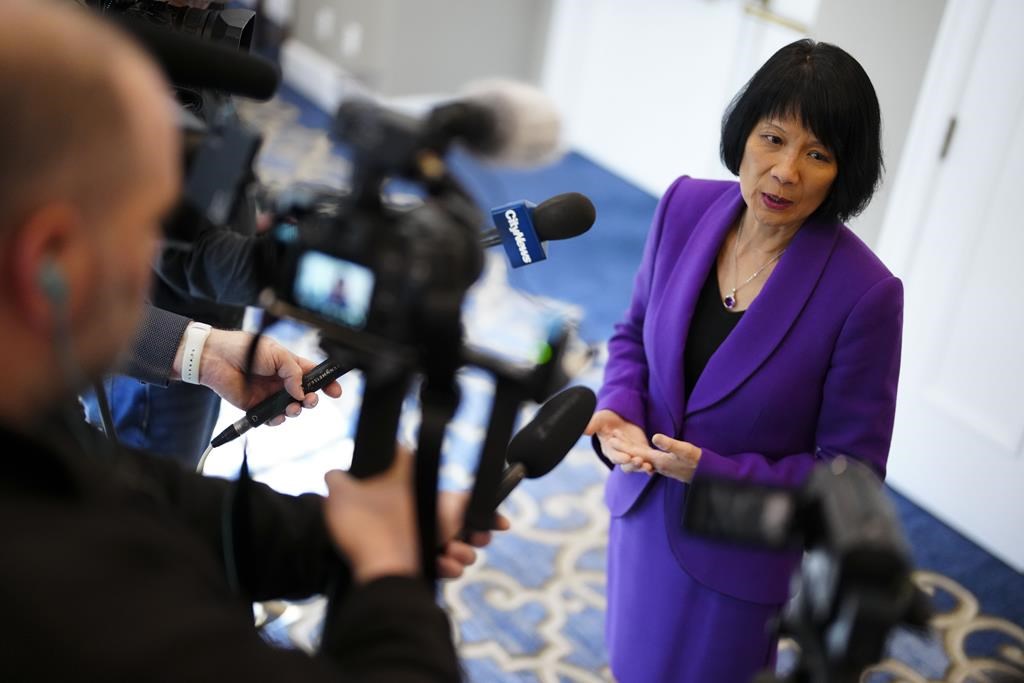Toronto’s mayor promised transparency Wednesday in the city’s efforts to co-host the 2026 FIFA World Cup, as she announced new oversight and advisory groups to help prepare for the increasingly costly event.
The city is set to host six matches as part of the international tournament that will also see games in Vancouver as well as across the United States and Mexico.
Toronto has estimated its part of the event will cost $380 million, an increase of $80 million compared to a 2022 forecast.
Speaking to city council, Mayor Olivia Chow said she would have handled Toronto’s deal with FIFA differently than her predecessor, John Tory.
“Would I have signed the deal without the agreement from the federal and provincial government? No. Would I have made this bid public if I’m able to, legally? Yes. However I am saddled with what we have now,” she said.
“I looked at the structure set up previously, it did not provide, for me, the confidence (that) it would provide the kind of scrutiny and involvement with members of council (expected).”
Chow said she was focused on managing the cost of hosting the games and providing transparency along the way.
As part of those efforts, Chow announced that she was “strengthening and clarifying” the structure and mandate of some organizational bodies involved in planning the event.
“As we prepare to host this marquee event, we must also strengthen our resolve to make it a success – not only financially, but in the strong and lasting connections it builds across communities, and how we reflect our shared values as we host the world,” Chow wrote in a letter sent to council Wednesday that laid out the changes.
The city will be expanding its executive steering committee that provides leadership and oversight to the FWC26 Toronto Secretariat — Chow will be serving as chair.
The advisory body was started in 2020 and will now include several members of city council along with provincial, federal and Indigenous representatives and partners.
There will also be three subcommittees, including a Champions Table to raise money through donations to offset event costs, a FWC26 Forever group tasked with event promotion, community outreach and economic development, and a FWC26 Subcommittee to review spending plans and expenditures.
“We need to find more money, donations,” Chow said at council, adding she welcomed ideas about potential ways to do so.
The mayor said finances related to the World Cup will be reported separately from other city budgets in an effort to ensure transparency.
At city hall, councillors questioned city manager Paul Johnson at length on the costs of security and transportation related to the event, as well as on labour agreements that would be involved. Johnson was also questioned on how vulnerable city residents might be affected.
“The position of the city of Toronto is to not have any untoward activity happen to unhoused persons or other persons who are vulnerable,” Johnson said.
Johnson also faced questions about the city’s deals with FIFA and Maple Leaf Sports & Entertainment.
MLSE operates BMO Field, where matches will be held, and will serve as the project manager for upgrades to the downtown stadium and the MLSE training facilities in Toronto’s north end, which will used for the tournament.
A letter of intent agreed between the city and the company lays out that MLSE will be held “harmless” for various performance aspects, including failure to complete construction or delays.
Johnson reiterated that gate receipts from ticket sales would go to FIFA.
In FIFA’s 2022 annual report, the sporting body said it made US$686 million in ticket sales for the 2022 World Cup in Qatar.
A report released by the city has said that hosting costs for the event are expected to be shared by all levels of government and that earlier projections, based on five group stage matches, forecast that the World Cup would generate an additional $392 million in gross domestic product for Toronto.
This report by The Canadian Press was first published March 20, 2024.


